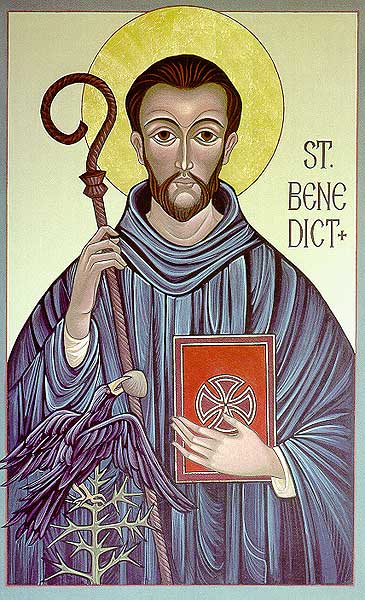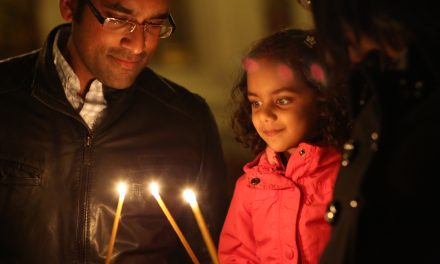St. Benedict dedicates four chapters of his rule (RB, ch. 8-11) to a discussion of the “night office,” or what is also referred to as Vigils. The night  office is a part of the monastic Liturgy of the Hours, during which the monks would rise during the middle of the night in order to pray the Psalms, hear the Word of God, and sing hymns. Though not all monastic orders still follow the prayer regimen exactly as it is laid out in the Rule, those who follow a strict observance (like Trappists, the order to which Thomas Merton belonged) and some other religious orders still rise each night for Vigils. Perhaps the closest those of us not practicing a vowed religious life can come to a sense of this kind of prayer is in the Easter Vigil liturgy. In the Easter Vigil, we stay awake into the earliest hours of the morning on Easter Sunday in order to celebrate the resurrection of Christ. Keeping vigil represents an ascetical practice of sacrifice – in this case, a sacrifice of sleep – in order to demonstrate a commitment to something more important: in this case, prayer. (Parents of young children will be able to identify with this kind of sacrifice and sleepless nights.)
office is a part of the monastic Liturgy of the Hours, during which the monks would rise during the middle of the night in order to pray the Psalms, hear the Word of God, and sing hymns. Though not all monastic orders still follow the prayer regimen exactly as it is laid out in the Rule, those who follow a strict observance (like Trappists, the order to which Thomas Merton belonged) and some other religious orders still rise each night for Vigils. Perhaps the closest those of us not practicing a vowed religious life can come to a sense of this kind of prayer is in the Easter Vigil liturgy. In the Easter Vigil, we stay awake into the earliest hours of the morning on Easter Sunday in order to celebrate the resurrection of Christ. Keeping vigil represents an ascetical practice of sacrifice – in this case, a sacrifice of sleep – in order to demonstrate a commitment to something more important: in this case, prayer. (Parents of young children will be able to identify with this kind of sacrifice and sleepless nights.)
These ancient Christian practices serve as an interesting point of comparison in looking at the recent trend for retailers to open earlier and earlier in the middle of the night on Black Friday. (See also Beth Haile’s post.) The question that Black Friday shopping in the middle of the night raises is: for what are we willing to sacrifice? Our greatest values and priorities are revealed in recognizing what we are willing to let go of in order to attain our highest ideals. Monks forgo sleep in order to keep vigil, and we forgo sleep in order to get a good deal.
I’m not claiming that we should all keep a monastic prayer schedule, nor that it is inherently wrong to shop for a good deal in order to buy gifts that express our love for family and friends. I’m claiming rather that we can pay attention to what we are willing to sacrifice for in order to attain the ideals that we cherish. Right now our country is in a massive financial mess, with skyrocketing debt, high unemployment, and a growing income gap. No one is talking about the need to sacrifice in order to get our country and economy back on track. The reality is that we are going to need to trim spending and raise more revenue in order to return to a long-term sustainable economy that supports all Americans.
The positive side of a crisis is that it can turn us inward to seek out our true ideals as a nation, and to ask ourselves what we truly value. Certainly, economics matters, but is it the core of what makes us Americans? Are we willing to sacrifice for the common good so that all Americans can have access to the basic goods of our country? In order to answer these questions we are going to have to step back from the ideological rancor of our political system and cultivate personal and civic spaces where such questions can honestly be explored. (I don’t think these questions can be asked in the current climate in Washington, on CNN or Fox, or in a shopping mall.) In other words, we are going to need to keep vigil on what our most sacred cultural values are, and be willing to make sacrifices in order to attain them.




I love this post. That is all.